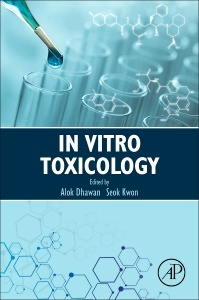Description
In Vitro Toxicology
Authors: Dhawan Alok, Kwon Seok (Soga)
Language: English
Subjects for In Vitro Toxicology:
Keywords
2D cell culture; 3D organoid culture; 3R principles; Alternative methods; Alternatives; Basal toxicity; Biomarkers; Cell culture; Cell function; Cell line; Chemical biological activity; Connectivity mapping; Cytotoxicity; Data interpretation; Descriptors; DNA damage; Dose-response curve; Embryonic stem cell; Estrogenic activity; EURL ECVAM; Eye damage; Eye irritation; Gene expression profiling; Genotoxicity; GLP; Hazard; Hsps; Human toxicity; ICCVAM; In silico toxicology; In vitro models; In vitro safety pharmacology; In vitro test; In vitro toxicity; In vitro toxicology; In vitro; iPSC; Lactate dehydrogenase; Molecular chaperones; Mutagens; New chemical entity; OECD guidelines; OECD test guideline; OECD; Organotypic; Organ-specific toxicity; Phototoxicity; Predictive toxicology; Protein aggregation disorders; Protein aggregation; Protein misfolding; Proteotoxicity; QSAR; Quantitative structure toxicity relationship; Risk assessment; Safety; Screening; Toxicants; Toxicity database; Toxicity endpoints; Toxicity; Ubiquitin proteasomal system; Validation
122.46 €
In Print (Delivery period: 14 days).
Add to cartSupport: Print on demand
Description
/li>Contents
/li>Biography
/li>Comment
/li>
In Vitro Toxicology details the protocols and methods of in vitro testing, highlighting the usefulness of models, methods and the cost-effectiveness and reproducibility of such methodologies. The current approaches and strategies required to develop an easy, reliable, validated and high throughput system for use in alternative animal models to circumvent in vivo testing are discussed in detail. The book also includes chapters on the principles involved in the general selection and use of models that address safety concerns, regulatory acceptance and the current understandings and strategies for the identification of biomarkers in toxicity testing.
Furthermore, principles involved in the general selection and use of models that address the issues of safety concerns and regulatory acceptance of these models are discussed, making the book beneficial to students, scientists, and regulators working in toxicology, as well as those in the field of chemicals and the safety assessment of novel materials.
He pioneered the identification of peripheral biomarkers of exposure, effect and susceptibility to xenobiotics. Using DNA damage in lymphocytes as a biomarker of exposure, he has established the reference values for DNA damage in healthy Indian population. He also developed and validated Drosophila melanogaster for in vivo genotoxicity assessment. These can have far reaching applications in predicting the adverse health effects of drugs and chemicals on human health. He was instrumental in promoting the cause of alternate to animal models in toxicology including in silico models.
Professor Dhawan has won several honours and awards including the INSA Young Scientist Medal in 1994, CSIR Young Scientist Award in 1999 the Shakuntala Amir Chand Prize of ICMR in 2002 and the Vigyan Ratna by the Council of Science and Technology, UP in 2011.
His work in the area of nanomaterial toxicology has won him international accolades as well and he was awarded two Indo-UK projects under the prestigious UK-IERI programme. He also has two European Union Projects under the FP7 and New INDIGO programmes.
He founded the Indian Nanoscience Society in 2007. In recognition of his work he has been elected Fellow, The National Academy of Sciences, India; Fellow, The Academy of Toxic
- Discusses new techniques and protocols in a clear and concise manner
- includes examinations of nanotoxicity, genotoxicity and carcinogenicity
- Explains practical laboratory methods and the theories behind in vitro testing
These books may interest you

Principles of Toxicology Testing 160.25 €

Principles of Toxicology Testing 214.69 €


